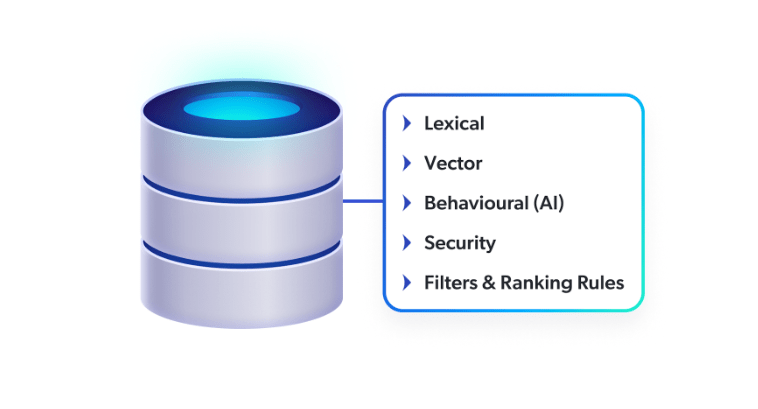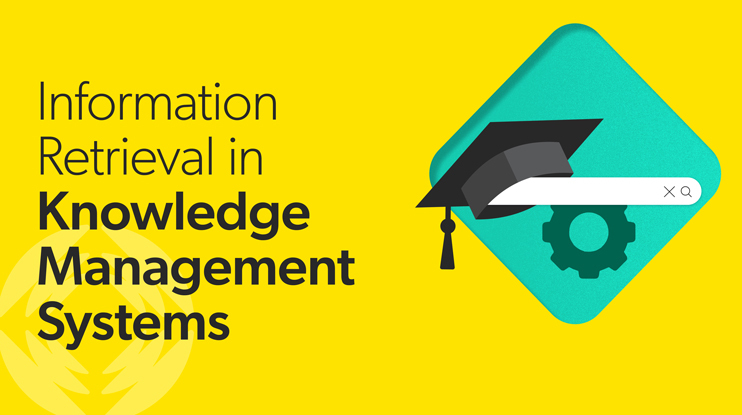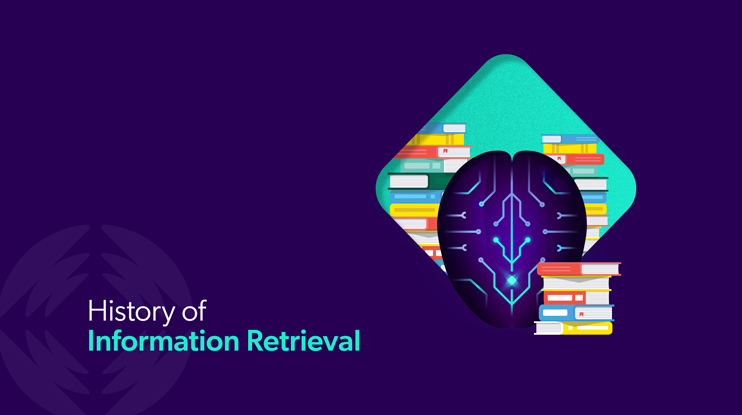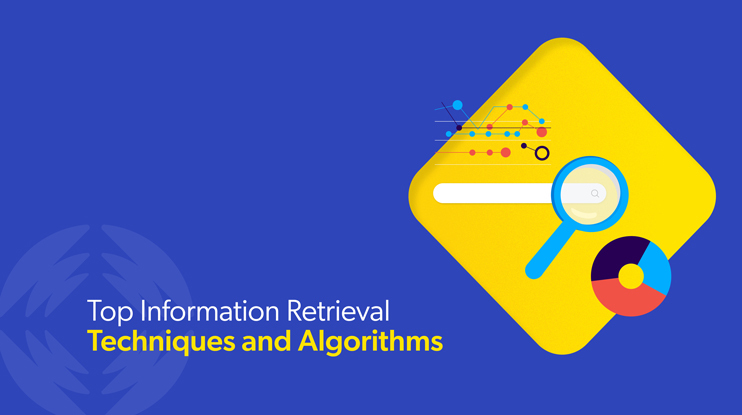Harnessing organization-wide knowledge is essential to scaling business operations and fostering growth in today’s data-driven landscape. But with knowledge often scattered in multiple formats in a variety of data stores throughout an enterprise, finding the right information quickly is one of the biggest hurdles to effective knowledge management. According to McKinsey, high-skill knowledge workers dedicate 19% of their week to searching for and gathering information.
This is where information retrieval (IR) comes in as a core component of an effective knowledge management system, helping users find information in vast collections of data and ranking them by relevance. Information retrieval systems — especially federated and unified systems — enable the speedy search and retrieval of relevant information that exist inside and outside the organization, including within relational databases, legacy systems and external websites.
While KMS solutions often include search functions, these are typically siloed, resulting in outdated, repetitive, and fragmented experiences that frustrate employees and reduce efficiency. Information retrieval tools provide a way to index and search data across different repositories, opening up access to massive stores of data and making possible knowledge discovery, retrieval, and dissemination throughout the enterprise. In this article, we examine how organizations benefit from incorporating expanded information retrieval into their knowledge management systems, resulting in greater enterprise collaboration, employee productivity and customer satisfaction.
Importance of Information Retrieval in KMS
A knowledge management system (KMS) is software to identify, collect and share knowledge for the collective benefit of an organization. These systems provide effective ways to create and capture organization’s knowledge assets, such as documentation, articles, reports and topical expertise. With a knowledge base as its foundation, a KMS enables efficient document management and an increase in organizational knowledge.
Relevant Reading: KMS vs AI Search: What’s the Difference?
However, as organizations grow and generate greater volumes of data from an increasing number of sources, the challenge becomes retrieving high quality knowledge in an actionable way when necessary. In other words, employees need to be able to find what they are looking for when they need it. An information retrieval system answers that challenge, increasing findability in the vastness of data by retrieving timely, relevant information from an organization’s knowledge repositories.
Information retrieval achieves this through the steps of indexing, organizing and retrieving data from massive data stores. Indexing enables IR systems to make diverse data types — emails, social media posts, documents — searchable by creating structured indexes. IR systems organize the data by mapping terms to the source material, such as through metadata creation and tagging, making it possible to quickly identify and retrieve relevant information when a user submits a query.
Additionally, IR systems also address the challenge enterprises face in extracting insights from knowledge resources containing unstructured data, such such as documents, emails, images and social media posts, which make up 80% of the data available to companies. Information retrieval systems can retrieve knowledge assets in the form of both structured and unstructured data, and use AI-powered advanced methods such as natural language processing (NLP) and machine learning to analyze unstructured data for patterns and relationships. Using these advanced information retrieval systems as knowledge management tools, companies come away with valuable insight into employee and customer needs that lead to better decision making.
Relevant Reading: Drowning in Documents? You Probably Have An Unstructured Content Problem
Advanced information retrieval systems also play an important role in enhancing the user experience, using AI and machine learning algorithms to access large volumes of diverse data and deliver relevant search results in real time, in context of the user and situation. For instance, support agents can use IR systems to swiftly address customer queries by drawing on previous interactions and order history, leading to a better customer experience.
Key Components of Information Retrieval in KMS
A review of the main parts of an information retrieval system can help with understanding how IR enhances knowledge management systems.
Optimized indexing and metadata management
An IR system tags and categorizes data to make it easier to search and retrieve in a process called indexing. In a KMS, effective indexing ensures all data, whether structured or unstructured, is able to be found and retrieved. Metadata management also gives data additional context, through metadata tagging, that makes searches more relevant and timely.

Smart search algorithms
IR systems use search algorithms to retrieve and rank relevant data in response to a user query. There are various techniques that can be used, depending on the use case and complexity of the query. Boolean search involves using operators like “and,” “or,” and “not” to define the scope of a search. Semantic search uses NLP and machine learning to interpret the intent and context of a query, resulting in more nuanced and relevant results. AI-driven models analyze extensive data sets to provide more accurate results and improve with each user interaction.
Natural language processing
In giving computers the ability to comprehend and interpret human language, natural language processing significantly improves a system’s search accuracy by comprehending user intent. NLP can make sense of inaccurate, vague or complex queries by understanding the nuances of the human language and matching the query to the right document, whether or not the query contains a misspelling or ambiguous term.
User interface
Providing a search user interface (UI) that is intuitive and anticipates user needs is crucial to knowledge discovery and usability. Features like auto-suggestion, personalized recommendations, and advanced filters help navigate searching a large store of knowledge across an enterprise.
Types of Information Retrieval Models in Knowledge Management
A variety of models can be applied to knowledge management for retrieving information, each with their own uses and strengths. These mathematical models predict which documents will be most relevant to a user query, and some rank the results according to their relevance.
Exact-match models
The group called exact-match models provide exact matches to a query, meaning documents are either retrieved or not, with no ranking involved. A traditional and widely used model that falls in this category is the Boolean model, which retrieves documents using the operators “and,” “or,” and “not.”
These models are simple and efficient, giving users control to fine tune the results using the operators, but the lack of a ranking means there isn’t a way to know which results are most relevant. These models are most useful in highly structured environments such as searches for legal cases or scientific articles.
Probabilistic models
Probabilistic models assess the likelihood of a document’s relevance to a query, ranking results based on this calculated probability.It calculates the probabilities using factors like how frequently a term appears in a document and document length.
These models are useful in situations where queries are not looking for an exact match or such a match is difficult to find. They are still widely used and foundational to systems today like search engines that benefit from the flexibility of ranking results by the likelihood of relevance.
Semantic search models
Going beyond the simple keyword matching of traditional models, semantic search models get to the intent behind queries. They accomplish this through machine learning algorithms and natural language processing to understand the patterns and relationships in words.
These models have been shown to provide more accurate and relevant results than through keywords matching by understanding the context of queries, which lead to better search experiences for your employees.
Challenges in Information Retrieval for Knowledge Management
Information retrieval plays a pivotal role in a knowledge management strategy by connecting people to the information they need, whether to succeed in their workplaces as employees or to solve issues on their own as customers. However, challenges remain in information retrieval for knowledge management:
- Data silos. As organizations generate more knowledge, data silos naturally form, isolating valuable information within department-specific repositories. A traditional IR tool may struggle to retrieve relevant data across these silos. Advanced search systems can build a unified search index of data from various sources, leading to quick and efficient information retrieval.
- Unstructured and semi-structured data. Unstructured and semi-structured data like text documents, emails and audio are tricky to organize, process and analyze with traditional IR techniques. This leads to knowledge gaps in the organization and lost opportunities for insights.
Advanced IR systems elevate user experience by using AI and machine learning to deliver contextually relevant, real-time search results tailored to the user’s needs. - Data privacy and security. While making knowledge more accessible to people throughout the enterprise is an important factor leading to the collective growth of skills and expertise, ensuring data privacy and security must remain a top concern in information retrieval.
Striking this balance is a challenge with the growing use of AI to collect and analyze massive amounts of data, and companies must mitigate risks through methods such as preventing access to personal data by unauthorized individuals.
Relevant Reading: Intranet Security: Can Search Safeguard Digital Workplaces?
Case Studies: Using IR Effectively in Knowledge Management
Many companies today are incorporating information retrieval in their knowledge management systems for optimal employee experiences and customer service.
UWHealth, the University of Wisconsin-Madison’s health system, serves more than a half a million patients per year across its six hospitals and outpatient sites. They struggled with content gaps in their intranet that affected the daily operations of staff members in many roles.
By implementing Coveo’s AI-powered search, content gaps were reduced by 50% and machine learning that detected patterns in behavior and intent led to contextually relevant content to staff members. For example, nurses interacting with patients could quickly find patient information for follow-up care and discharge.
Computer security software company Forcepoint struggled with knowledge silos that led to employee and customer frustrations with finding relevant information. By uniting the employee and customer experiences in a single AI search and recommendation platform, Forcepoint was able to unlock access to knowledge across the entire enterprise.
This boosted internal employee efficiency and led to an increase in the percentage of customer self-service cases.
The Future of Information Retrieval in Knowledge Management
With the nonstop increase in the amount of data and the number of sources producing data, knowledge management will keep changing and growing to adapt to organizational needs.
Additionally, rapid advances in AI, machine learning and NLP will change and shape the way humans create, consume and share knowledge. Already we are seeing how advanced search capabilities using AI allow users to find information from large, complex datasets with amazing speed and accuracy.
As semantic search continues to mature, IR systems will get better at using the context of a query along with information about the user such as their role at the company and search history to anticipate query intent and provide content recommendations without the user even asking.
AI-powered search systems will also be able to deliver highly personalized knowledge to users based on their profiles and behavior, aiding in knowledge discovery and facilitating new collaborations and connections throughout the enterprise.
Advancements in generative AI and voice-based search mean the way workers and customers search for and interact with knowledge management systems will become more conversational and intuitive.
Relevant Reading: Evolution of Generative AI: How To Keep Up In A Rapidly Changing World
Conclusion
Providing employees with streamlined access to information empowers a smarter, more efficient workforce that delivers impactful results.
On the flip side, the inability to organize and retain knowledge results in wasted time and effort through rebuilding knowledge, repetition of past mistakes, increased errors and dissatisfied employees.
By integrating AI-powered information retrieval into knowledge management, organizations can equip employees to find and access knowledge faster and easier within a flood of data, leading to more rapid growth in their competencies and better experiences for customers.
Uncover the Coveo Platform on our self-serve demo hub:









